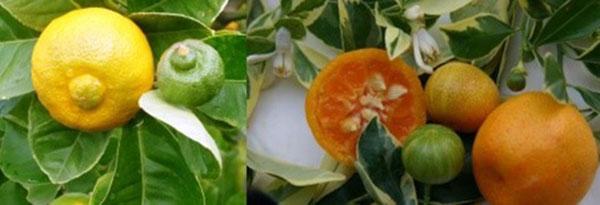Rare citrus plants
 Many gardeners are fond of growing citrus fruits, and tangerines are most often indoor pets. Did you know that there are rare citrus plants with very unusual characteristics for this species? Some are distinguished by the original color of the leaves, while others have an extraordinary taste of the fruit. However, the fact that such species are very different from their relatives does not interfere with growing them as a room culture. But let's take a closer look at the original citrus.
Many gardeners are fond of growing citrus fruits, and tangerines are most often indoor pets. Did you know that there are rare citrus plants with very unusual characteristics for this species? Some are distinguished by the original color of the leaves, while others have an extraordinary taste of the fruit. However, the fact that such species are very different from their relatives does not interfere with growing them as a room culture. But let's take a closer look at the original citrus.
Rare citrus plants: unusual orange and non-sour lemon
We all know that orange leaves are large, dense and colored in a rich dark green, and lemon the taste is very sour. However, with Mother Nature and breeders, the flight of imagination is limitless and turns the generally accepted norms. For example, striped orange and sweet lemon are real exotics. Are you surprised? Then we present you interesting varieties for a home citrus greenhouse.
Striped orange
This is actually the name of the variegated Valencia orange. Its crown looks very decorative thanks to the original, white and green, coloring of the leaves. They resemble variegated ficuses. No less interesting are the fruits, because of which, in fact, the orange is called striped. At the stage of semi-ripeness, they are yellow, with a green longitudinal strip, like in watermelons. When the orange is fully ripe, the stripes disappear and it takes on its characteristic orange color.
The taste of a striped orange is what it should be, but a light coniferous shade is mixed with the aroma of citrus fruits.
The variegated form of the Valencia orange is much more demanding to care for. Only about 50% of the leaves are involved in photosynthesis. Light absorption occurs only in areas colored green. This means that the lighting for the citrus must be good.
Sweet lemon
The name of this rare citrus plant speaks for itself: its fruits are sweet, and without acid. The shape of the fruit is also slightly different: they are more rounded, like tangerines, but the scent of lemon remains. The variety is called that - Iranian sweet lemon. It grows in the form of a tree, rapidly growing a dense crown with large green leaves. What's more interesting: they don't smell of citrus, but of bergamot.
The sweet lemon is grown in the same way as its acid-bearing relatives. But the variety has one feature: it enters fruiting late, only 5 years after grafting.
Varietal features of rare citrus fruits: Valencia orange and sweet Iranian lemon - video